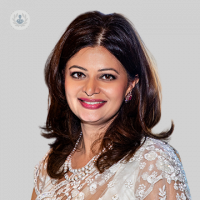The GnRH agonist trigger: A revolution in IVF
Written in association with:Treatment In the world of fertility treatments, innovations can change everything. One such innovation is the GnRH agonist (GnRHa) trigger protocol, which has transformed how we approach in vitro fertilisation (IVF), particularly in preventing ovarian hyperstimulation syndrome (OHSS) and enhancing reproductive outcomes.
Revered consultant senior fertility specialist Dr Anu Chawla provides a guide to this revolutionary IVF treatment.

Introduction to GnRHa trigger
The GnRHa trigger protocol emerged as a solution to prevent OHSS, a serious complication of IVF characterised by enlarged ovaries and fluid accumulation. Traditionally, human chorionic gonadotropin (hCG) was used to trigger egg maturation, but it posed risks for OHSS. GnRHa trigger works differently, causing a temporary flare-up of hormones similar to a natural cycle, but with a shorter duration and less impact on the body compared to hCG.
OHSS prevention
For patients at risk of OHSS, GnRHa trigger, combined with freezing of all embryos has become a game-changer. By avoiding a fresh embryo transfer and instead freezing embryos, we can safely manage OHSS risk without compromising reproductive success.
Fresh embryo transfer challenges
Initially, using GnRHa for triggering egg maturation and then transferring embryos fresh posed challenges. Early studies showed unexpectedly low pregnancy rates with GnRHa triggers, mainly due to insufficient support for the luteal phase, which is the period after egg retrieval and before pregnancy confirmation.
Understanding the luteal phase
The luteal phase is crucial for embryo implantation and early pregnancy support. GnRHa trigger initially led to low levels of luteal phase hormones, particularly LH, which affected progesterone levels needed for successful implantation.
Development of the protocol
Over years of research and refinement, clinicians learned to supplement the luteal phase with LH activity, such as small doses of hCG, to support the corpus luteum (the structure that forms after egg release and produces hormones critical for early pregnancy).
Improving reproductive outcomes
Through adjustments in the protocol, such as adding small doses of hCG, midluteal progesterone levels improved significantly. This change boosted ongoing pregnancy rates from initial lows to much more promising levels, demonstrating the importance of proper luteal phase support.
Meta-analysis and acceptance
Initially met with scepticism, the GnRHa trigger eventually gained acceptance after meta-analyses and further research validated its effectiveness. Today, it is widely acknowledged as a safe and effective method in IVF, particularly in reducing OHSS risk and improving pregnancy outcomes.
Personalised care
The evolution of the GnRHa trigger also ushered in a shift towards personalised medicine in fertility treatments. Clinicians now monitor luteal phase hormones closely and tailor treatment plans to individual needs, ensuring optimal conditions for embryo implantation and pregnancy.
Future prospects
Looking ahead, advancements continue to refine the GnRHa trigger protocol. Research explores new ways to enhance luteal phase support and further improve outcomes, aiming for even higher success rates in both fresh and frozen embryo transfer cycles.
The GnRHa trigger protocol has evolved into a cornerstone of modern fertility care. Embraced by the IVF community, it continues to shape the way we design IVF treatments to meet the hope of couples in their journey to successful parenthood.
If you are struggling with fertility and would like to book a consultation with Dr Chawla, do not hesitate to do so by visiting her Top Doctors profile today.


